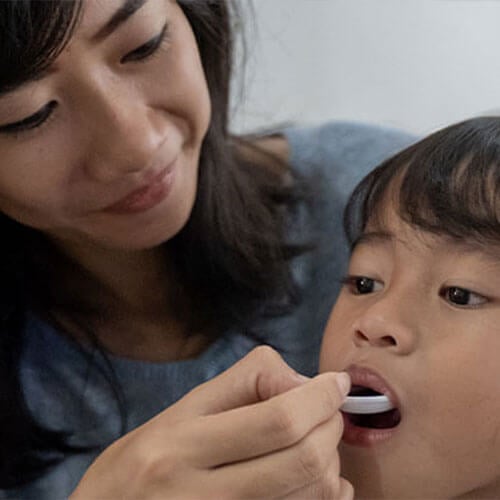Keeping your kids healthy and strong is definitely one of a parent’s top priorities. However, despite best efforts, it is inevitable that the little ones may still be affected with allergic reactions, coughs, colds, or fever.
When your child develops symptoms, don’t panic, as there are medicines which offer relief and make them feel better. As always, it is important to consult your pediatrician who can better guide you and manage your sick child. . Remember to follow your doctor’s instructions regarding the proper dosage, administration and schedule of giving the medicines. Learn more about the medicines you may want to be ready with in case your kids are sick.
Medicines for Allergic Reactions
If your child has allergies such as allergic rhinitis and presents with cough and cold, or runny nose, itchy and watery eyes, and/or frequent sneezing without fever or body pain, antihistamines can help relieve her of her symptoms. It is also important to be able to identify possible allergen/s responsible for triggering these symptoms. Inform your pediatrician once signs of allergic reaction appears.
Medicines with diphenhydramine, chlorpheniramine, or loratadine may be advised. Ask your pediatrician if your child can take Loratadine. You can also inquire the need for a stronger dose of prescription medicine like Diphenhydramine.
However, in case life-threatening allergy symptoms manifest, such as swelling of eyes, nose, lips, and/or face; itching and rashes, and/or tightening of the throat, seek medical attention immediately.
Medicines for Fever
Paracetamol can be a good choice for kids with fever, especially those who are 29 days old and above. This type of medicine may help reduce high body temperatures, and address other symptoms like headache, stomach pain, ear pain, body pain or feelins of weakness.
Talk to your kid’s pediatrician about giving paracetamol. Give your child the correct dose as advised by your pediatrician.
However, if fever persists and the child develops other symptoms like diarrhea, vomiting, swelling, and/or appetite loss, seek medical attention immediately.
For infants, 28 days old and younger, please consult a pediatrician.
Medicines for Coughs
Just like with adults, the type of cough medicines you should give to your kids would depend on the condition they have.
For a dry or non-productive cough, a suppressant like dextromethorphan may help block the reflex responsible for coughing. Ask a pediatrician if a prescription medicine like Dextromethorpan can work. This cough syrup may help provide relief from dry cough that can be caused by a common cold, sore throat, or respiratory tract infection.
On the other hand, if your kid is struggling with a wet or productive cough characterized by the presence of mucus and/or phlegm, a mucolytic like ambroxol may help. It aids in thinning and loosening secretions prompting better breathing and decongesting the airways.
Consult a pediatrician about a mucolytic ambroxol. This particular medicine may trigger fluid production in therespiratory tract that may break down the mucus in it and lead to less thick and sticky mucus and/or phlegm.
Medicines for Cold
If your kid has the sniffles, medicines with either phenylephrine or chlorphenamine maleate may help. The former helps reduce nose and ear swelling and the discomfort that comes with it, and promotes better breathing. The latter is an antihistamine that may help reduce common allergy symptoms like itchy and watery eyes, runny nose, sneezing, and/or rashes.
Medicines for Stomach Issues Like Colic (Kabag)
This condition is characterized by symptoms like a bloated stomach (matigas na tiyan), stomach pain, and/or incessant crying among infants without a known cause, despite previous instances of being fed and diaper changes.
Although colic is common among children at this age, it does cause discomfort. To alleviate colic among infants or children, you can ask your doctor about giving them simeticon. This medicine may help relieve discomfort caused by gas build-up in the stomach and intestines, as well as symptoms of colic or kabag and target bloating, fullness, air swallowing, or dyspepsia.
In case your child experiences a fever alongside colic, you can ask your doctor about giving them the recommended paracetamol dose for their age. If symptoms still persist, immediately seek medical attention.
What to Do AFTER the Kids Take the Medicines
Once your kids are done taking medicines and they’re feeling better, store these products properly. Read the medicine’s information sheet to know whether it needs to be kept in a refrigerator or in a cool and dry place away from sunlight.
Most importantly, keep medicines away from your kids, especially curious little ones who tend to grab things. Store medicines in a hard-to-reach area for kids like kitchen cabinets, away from a stove, sink, or hot appliance.
Lastly, bear in mind that doctors know best. Avoid giving medicines without the doctor’s advise. Your pediatrician or family doctor will always work with you to provide the necessary care for your child at all times.
References:
https://www.parents.com/health/medicine/antibiotics/medicine-cabinet-checklist/
https://www.mottchildren.org/health-library/sig55751
https://kidshealth.org/en/parents/medication-safety.html
https://mrmjournal.org/mrm/article/view/511
https://www.nhs.uk/medicines/paracetamol-for-children/
https://www.webmd.com/drugs/2/drug-21821/phenylephrine-oral/details
https://www.medicinesforchildren.org.uk/medicines/chlorphenamine-maleate-for-allergy/#
https://www.medicoverhospitals.in/medicine/dicycloverine
https://www.hopkinsallchildrens.org/Patients-Families/Health-Library/HealthDocNew/First-Aid-Kit
https://www.healthhub.sg/a-z/medications/390/Mucolytics-and-Expectorants
https://www.knowyourotcs.org/ingredient/dextromethorphan/
https://www.healthline.com/health/wet-cough https://www.healthline.com/health/how-to-get-rid-of-dry-cough








